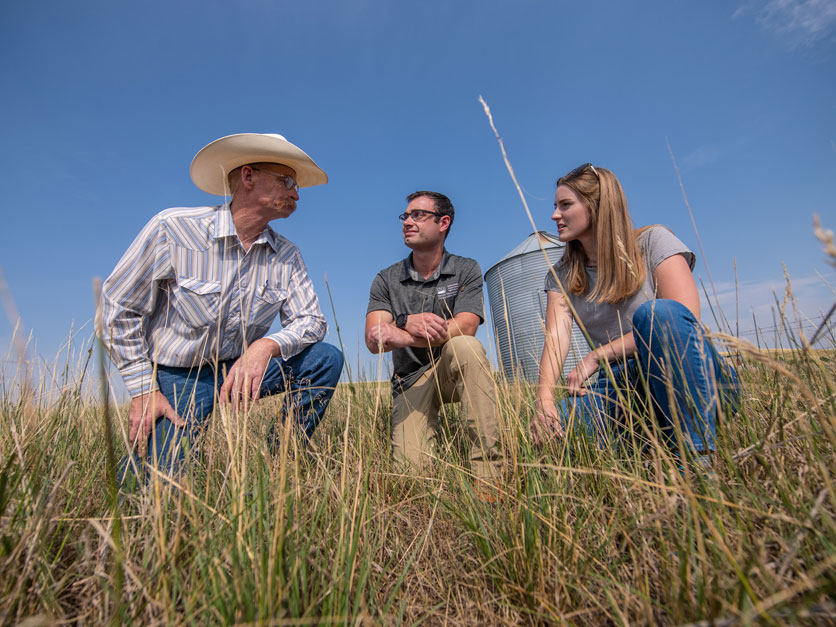Senate Ag Committee members used a hearing on farm bill conservation programs Wednesday to examine the Conservation Reserve Program more deeply as Farm Service Agency Administrator Zach Ducheneaux touted his "working lands" approach to the program.
Ducheneaux, who testified alongside Natural Resources Conservation Service Chief Terry Cosby at a wide-ranging hearing that covered a number of USDA-led conservation programs, told lawmakers that emergency haying and grazing opportunities provided in CRP are a draw for producers.
The "working lands" approach to CRP, he said, helps producers adapt to drought conditions and gives them the ability to continue using their land "in a different way."
"Emergency haying and grazing of CRP lands has literally kept cow herds together for producers that have CRP and producers that are neighbors or in the region of CRP areas," he said.
Sen. Michael Bennet, D-Colo., expressed concern about western producers facing "dust bowl" conditions and not wanting to enroll their low-value land in CRP due to the rental rates they would receive. In Colorado's Prowers County, for instance, he said rental rates sit at $13 an acre, too low to incentivize producers with marginal land from enrolling. That low of payment, he said, "is just not going to achieve the policy objective CRP wants," especially when farmers in other parts of the country are receiving upwards of $300 per acre.
Ducheneaux responded by saying his working lands efforts can help producers get value from the land in addition to payments offered by the program.
But other senators are worried the CRP payments may be too high.
Sen. Chuck Grassley, R-Iowa, pressed Ducheneaux on the department's decision to add a 10% inflation adjustment in the 2021 signup CRP for contracts, even though the 2018 farm bill capped CRP payments at 85% of county rental rates. Grassley said this increases the chance of the federal government outbidding young and beginning farmers.
"The federal government would be a very disastrous competitor," Grassley said.
Ducheneaux, in response, said department staff "lean heavily" on county committees to weigh in where they feel data from USDA's National Agricultural Statistics Service is incorrect, but also consider the economic impacts to people in the county.
He also told Grassley, who asked him whether the agency took into consideration that it would be "violating federal law if the inflationary cap went over the 85% county average," that the department adhered to the guidance of the USDA's Office of the General Counsel.
The hearing's discussions extended beyond CRP. Several senators, including Joni Ernst, R-Iowa, Peter Welch, D-Vt., and Ben Ray Luján, D-N.M., also pressed Ducheneaux and Cosby about the need for more streamlined FSA and NRCS applications.
Ducheneaux and NRCS Chief Terry Cosby both noted the presence of complexities in the current processes and said they were working to figure out ways to simplify procedures for producers and make sure agencies coordinate to quickly help those seeking assistance after disasters.
Don’t miss a beat! It’s easy to sign up for a FREE month of Agri-Pulse news! For the latest on what’s happening in Washington, D.C. and around the country in agriculture, just click here.
"It seems like we haven't had broad participation in a lot of these programs because folks didn't understand the process," Cosby told Ernst. "We are looking at all communities, all sources and trying to make sure that we are more flexible and our programs are more available to folks that want to participate."
Sen. Roger Marshall, R-Kan., also pressed Cosby about possible changes to NRCS's Technical Service Provider Program, which allows certified private sector conservation experts to perform duties normally left to NRCS staff.
Marshall suggested the NRCS should allow Certified Crop Advisors into the program to expand the number of Technical Service Providers available to farmers, an idea that has been suggested by some groups in the past.
Cosby said NRCS state offices are looking at changes to the TSP certification process, which may include considering previous experience rather than focusing on educational history.
For more news, go to www.Agri-Pulse.com.


